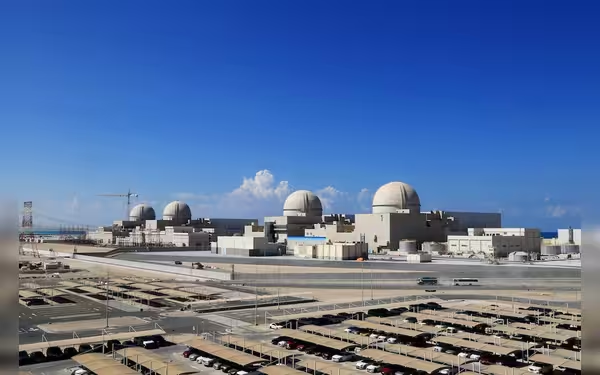Saturday, November 16, 2024 07:45 PM
UAE Achieves Milestone with Completion of Barakah Nuclear Power Plant
- UAE completes Arab world's first nuclear power plant.
- Barakah to generate 40 terawatt-hours annually.
- Significant step towards energy diversification and sustainability.
 Image Credits: arabnewspk
Image Credits: arabnewspkUAE completes the Barakah Nuclear Energy Plant, marking a significant step towards energy diversification and sustainability in the Arab world.
The United Arab Emirates (UAE) has made a remarkable achievement by completing the Arab world’s first nuclear power plant, known as the Barakah Nuclear Energy Plant. This significant milestone was announced on Thursday, marking a pivotal moment in the region's energy landscape. The plant is expected to produce an impressive 40 terawatt-hours of electricity each year once its fourth and final reactor begins commercial operations.
Located in Abu Dhabi, the Barakah Nuclear Energy Plant is set to generate about 25 percent of the electricity required by the UAE, a country known for its hot desert climate where air conditioning is essential. To put this into perspective, the electricity produced by Barakah is nearly equivalent to the annual consumption of New Zealand, showcasing the plant's capacity to meet substantial energy demands.
The Emirates Nuclear Energy Corporation (ENEC) has stated that the plant will supply power to major companies, including the Abu Dhabi National Oil Company, Emirates Steel, and Emirates Global Aluminium. The name “Barakah,” which translates to “blessing” in Arabic, reflects the positive impact this facility is expected to have on the nation’s energy security.
Since the first reactor began operations in 2020, the UAE has been on a journey towards diversifying its energy sources. Emirati President Sheikh Mohammed bin Zayed emphasized the importance of this development, calling it a “significant step on the journey toward net zero.” He expressed a commitment to prioritizing energy security and sustainability for the benefit of the nation and its people.
According to the International Atomic Energy Agency, the Barakah plant will need to be disassembled after approximately 60 to 80 years of operation. The UAE, which consists of seven emirates, is one of the largest oil producers in the OPEC cartel. While the country has historically relied on oil, it is now investing billions to develop renewable energy sources, aiming to meet half of its energy needs through renewables by 2050.
Last year, the UAE hosted the COP28 UN climate talks, where global leaders agreed to transition away from fossil fuels. This commitment to sustainability is further underscored by the UAE's nuclear ambitions, which the country insists are for “peaceful purposes.” The UAE has ruled out any plans for uranium enrichment or nuclear reprocessing technologies, focusing instead on using gas-powered stations and harnessing solar energy, with one of the world’s largest solar plants located just outside Abu Dhabi.
As the Barakah Nuclear Energy Plant begins operations at its fourth unit, the UAE is taking significant strides towards achieving its net-zero goals. This development not only enhances the country’s energy security but also positions it as a leader in the region's transition to cleaner energy sources. The successful completion of this nuclear plant serves as a reminder of the importance of innovation and sustainability in addressing the energy challenges of the future.













